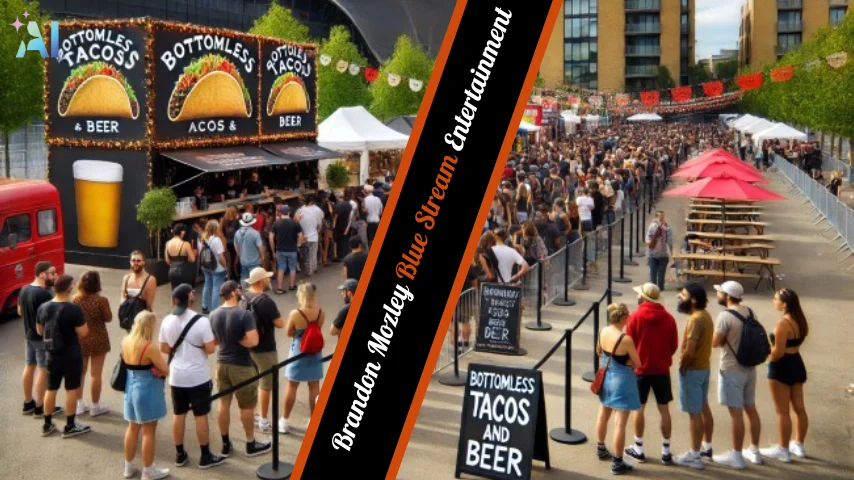Brandon Mozley and Blue Stream Entertainment. Brandon Mozley, an Orange County native, burst onto the event management scene with a vision to revolutionize food and drink festivals across the United States. His brainchild, Blue Stream Entertainment, quickly gained attention for organizing large-scale events that promised to unite communities through culinary experiences. However, the company’s journey has been marked by both triumphs and significant setbacks, offering valuable lessons in event management, customer satisfaction, and business ethics.
The Rise of Blue Stream Entertainment
Mozley founded Blue Stream Entertainment with a clear goal: to create engaging food and beverage festivals that would bring people together. His flagship event, the West Coast Taco & Beer Festival, epitomized this vision by offering a tantalizing combination of unlimited tacos and beer samples. This unique concept tapped into the growing popularity of food-centric events and the craft beer movement, positioning Blue Stream Entertainment as an innovative player in the industry.
Initial Success and Expansion
The West Coast Taco & Beer Festival quickly gained traction, attracting thousands of attendees in multiple cities, including San Francisco, San Jose, and San Diego. The promise of bottomless tacos from top local chefs, paired with an array of craft beer samples, resonated with food enthusiasts and casual diners alike. This initial success fueled Blue Stream Entertainment’s rapid expansion, with the company organizing similar events across various locations.
The Challenges Emerge
Logistical Nightmares
As Blue Stream Entertainment’s events grew in scale and popularity, significant logistical challenges began to surface. Attendees reported long wait times, insufficient food supplies, and overcrowding at various festivals. These issues pointed to a fundamental problem in the company’s event planning and execution strategies.
The San Francisco Fiasco
One of the most notable controversies occurred during the West Coast Taco & Beer Festival in San Francisco. This event became a turning point for Blue Stream Entertainment, as it highlighted the company’s inability to deliver on its promises. Attendees voiced their frustrations on social media, describing scenarios where they waited in long lines only to find that food had run out. The backlash was swift and severe, with many ticket holders feeling deceived by the event’s advertising.
False Advertising and Consumer Trust
Broken Promises
The cornerstone of Blue Stream Entertainment’s marketing strategy was the promise of “bottomless tacos and beer.” However, this claim repeatedly fell short at various events, with food and drink supplies often depleted within hours of the festivals’ opening. This discrepancy between advertising and reality led to widespread accusations of false advertising, severely damaging the company’s reputation.
Refund Controversies
In the wake of these failed events, many attendees sought refunds. However, Blue Stream Entertainment’s refund process became another source of controversy. Customers reported difficulties in securing refunds, with some encountering fake customer service accounts on social media platforms. These scams, while not directly attributable to Blue Stream Entertainment, further complicated the company’s relationship with its customers and raised questions about its ability to manage post-event issues.
Legal and Ethical Implications
Better Business Bureau Warning
The mounting complaints against Blue Stream Entertainment caught the attention of the Better Business Bureau (BBB). The organization issued a warning to consumers, advising caution when dealing with event organizers like Blue Stream Entertainment. This official warning not only affected the company’s reputation but also raised broader questions about accountability in the event management industry.
Transparency and Consumer Rights
The controversies surrounding Blue Stream Entertainment’s events sparked important discussions about transparency and consumer rights in the event industry. Many argued that companies should be held to a higher standard in terms of accurately representing their events and delivering on promises made in advertising materials.
Lessons Learned and Attempts at Improvement
Acknowledging Shortcomings
In response to the mounting criticism, Brandon Mozley and Blue Stream Entertainment took steps to acknowledge their shortcomings. Mozley issued public apologies following high-profile event failures, recognizing the need for significant changes in the company’s operations.
Focus on Event Logistics
One of the primary areas identified for improvement was event logistics. Blue Stream Entertainment began exploring ways to ensure adequate food supplies, improve crowd management, and reduce wait times. These efforts aimed to address the core issues that had plagued previous festivals.
Rebuilding Public Trust
Recognizing that regaining consumer confidence would be crucial for the company’s survival, Blue Stream Entertainment pledged to increase transparency in its advertising and event planning processes. The company also committed to developing clearer refund policies to address customer concerns more effectively.
Strategies for Future Success
Scaling Down Events
In an effort to better control quality and deliver on promises, Blue Stream Entertainment considered scaling down the size of its festivals. By focusing on smaller, more manageable events, the company aimed to provide a better experience for attendees while minimizing the risk of logistical failures.
Diversification of Offerings
Despite the setbacks, Brandon Mozley and Blue Stream Entertainment recognized the potential for growth in the food and beverage event industry. The company began exploring opportunities to expand beyond taco and beer festivals, considering other types of food-centric events that could appeal to a broader audience.
Embracing Technology
To address some of the logistical challenges faced in the past, Blue Stream Entertainment looked towards technological solutions. The company considered implementing mobile apps for ticketing, providing real-time updates on food availability, and improving overall event management. These technological enhancements could potentially streamline operations and improve the attendee experience.
Rebranding Efforts
Given the negative associations that had developed around the Blue Stream Entertainment brand, the company contemplated a complete rebranding. This strategy could involve a new name, logo, and marketing approach, emphasizing the company’s commitment to quality and transparency. A successful rebranding could help the company distance itself from past controversies and appeal to both previous attendees and new customers.
The Road to Redemption
Learning from Mistakes
The journey of Brandon Mozley and Blue Stream Entertainment serves as a cautionary tale for aspiring event organizers. The company’s experiences highlight the importance of careful planning, honest advertising, and effective communication with attendees. By learning from these mistakes, Blue Stream Entertainment has the opportunity to transform its approach and set new standards in the industry.
Rebuilding Relationships
A crucial aspect of Blue Stream Entertainment’s potential recovery lies in rebuilding relationships with attendees, vendors, and local communities. This process requires consistent delivery of high-quality events, transparent communication, and a demonstrated commitment to customer satisfaction. By focusing on these areas, the company can gradually restore trust and rebuild its reputation.
Innovation and Adaptation
The events industry is constantly evolving, and Blue Stream Entertainment’s future success will depend on its ability to innovate and adapt. By staying attuned to consumer preferences, embracing new technologies, and continuously refining its event concepts, the company can position itself for long-term growth and sustainability.
Conclusion
The story of Brandon Mozley and Blue Stream Entertainment is a complex narrative of ambition, missteps, and potential redemption. From its promising beginnings to the controversies that threatened its existence, the company’s journey offers valuable insights into the challenges of event management and the importance of maintaining consumer trust.
As Blue Stream Entertainment works to overcome its past issues, the company’s future remains uncertain but not without hope. By implementing significant operational changes, embracing transparency, and focusing on delivering high-quality experiences, Brandon Mozley and his team have the opportunity to redefine their place in the event industry.
The lessons learned from Blue Stream Entertainment’s experiences extend beyond the company itself, offering important takeaways for the entire event management industry. As consumers become increasingly discerning and social media amplifies both successes and failures, event organizers must prioritize honesty, quality, and customer satisfaction above all else.
Ultimately, the story of Brandon Mozley and Blue Stream Entertainment serves as a reminder of the delicate balance between ambition and execution in the business world. It underscores the importance of building a strong foundation, maintaining ethical practices, and always putting the customer experience first. As the company continues its journey towards redemption, it will be watched closely by both industry insiders and consumers, potentially setting new standards for accountability and innovation in event management.





